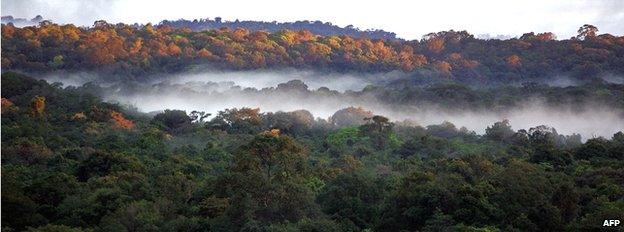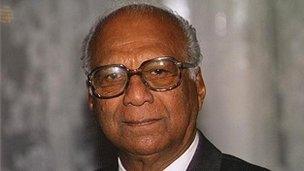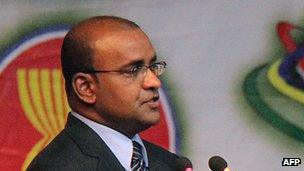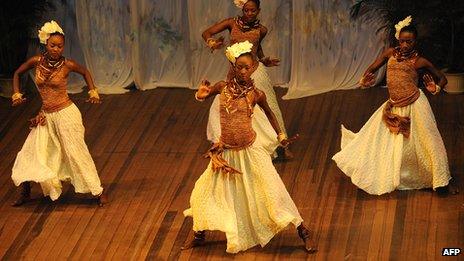Guyana profile - Timeline
- Published
A chronology of key events:
1498 - Christopher Columbus sights Guyana.
1580 - Dutch establish trading posts upriver.

Much of southern Guyana is covered by Amazonian rainforest
1620 - Dutch West India Company establishes a foothold in Guyana, including armed bases, and imports slaves from Africa to work on the sugar plantations.
1780-1813 - Guyana changes hands several times between the Dutch, French and British.
British rule
1814 - Britain occupies Guyana during the Napoleonic Wars.
1823 - Major non-violent slave rebellion crushed in Demerara.
1831 - Guyana officially declared a British colony.
1834 - Slavery abolished; many slaves leave plantations to set up their own freeholdings and are replaced by indentured workers mainly from India.
1879 - Gold is discovered in Guyana and is followed by an economic boom.
1889 - Venezuela lays claim to a large portion of Guyana west of the Essequibo river.
1899 - International arbitration tribunal rules in favour of Guyana (then called British Guiana) in the territorial dispute with Venezuela.
British intervention
1953 - Britain suspends Guyana's constitution, sends in troops and installs an interim administration after democratic elections for parliament produces a result not to its liking - a victory for the left-wing Indo-Guyanese Progressive People's Party (PPP).
1957 - Britain restores Guyanese constitution; PPP splits along racial lines, with Cheddi Jagan leading a mostly Indian party and Forbes Burnham leading a party of African descendants, the People's National Congress (PNC).
1961 - Guyana granted full autonomy, with Britain retaining control over internal and defence matters; Jagan of the PPP becomes prime minister.
1962 - Venezuela revives its territorial claims on Guyana; Cheddi Jagan introduces austerity programme, sparking off violent riots and a general strike; British troops sent in to restore order.
1963 - Racial violence between people of African origins and Indian supporters of Jagan.
Independence
1966 - Guyana becomes independent with Forbes Burnham as prime minister.
1970 - Guyana becomes a republic within the British Commonwealth with Raymond Arthur Chung as titular president.
1978 - Nine hundred members of a religious sect commit mass suicide at Jonestown, a community established by sect leader Jim Jones.
1980 - Guyana gets a new constitution and Burnham becomes the country's first executive president.
Economic decline, elections
1985 - Desmond Hoyte (PNC) becomes president following the death of Burnham; economy begins to deteriorate.
1992 - PPP wins first completely free parliamentary elections since independence; Cheddi Jagan becomes president.
1997 - Jagan dies and is replaced by his wife, Janet, after elections.
1998 - Government declares state of emergency in Georgetown in response to violent riots amid allegations of discrimination by PPP against Afro-Guyanese.

Cheddi Jagan served as prime minister before independence - 1961-4 - and later as president - 1992-7
1999 - Bharrat Jagdeo becomes president after Janet Jagan resigned for health reasons.
2000 - Long-running dispute with Suriname over the offshore border comes to a head when Surinam gunboats evict an oil exploration rig from the area. Guyana had approved the exploration.
2002 July - TV presenter Mark Benschop charged with treason. Court says he encouraged protest in which presidential complex was stormed by demonstrators, who were complaining of discrimination against Afro-Guyanese.
2003 April - US embassy employee is kidnapped and released after a ransom is paid. The abduction is part of a wave of violent crime; the murder rate in 2002 quadrupled to more than 160.
2004 May - Home Affairs Minister Ronald Gajraj steps down to allow an inquiry into allegations that he is linked to a death squad accused of executing hundreds of suspected criminals.
2004 June - UN sets up tribunal to try to resolve long-running maritime border dispute between Guyana and neighbouring Suriname.

President Jagdeo campaigned for action on climate change and in 2007 called for slavery reparations
2004 December - Jury at trial of TV presenter Mark Benschop, charged with treason in 2002, fails to deliver unanimous verdict, necessitating re-trial.
2005 January - Government declares the capital a disaster zone as severe flooding follows days of continuous rain. More than 30 people are killed. UN estimates loss to the economy to be $500m.
2005 April - Ronald Gajraj reappointed as interior minister after inquiry clears him of direct involvement in killings of known and suspected criminals. He resigns in May.
2006 April - Agriculture Minister Satyadeow Sawh is shot dead. The murder is part of a string of gun crimes. The ruling party says the killing is intended to incite pre-election violence.
2006 August - President Bharrat Jagdeo wins another five-year term in general elections.
2007 June - Former Guyanese MP Abdul Kadir is arrested in Trinidad on suspicion of involvement in a plot of blow up New York's JFK airport.
2007 September - A UN tribunal rules in the Guyana-Suriname dispute over maritime territory, giving both a share of a potentially oil-rich offshore basin.
2008 July - President Bharrat Jagdeo accuses the EU of using its economic might to 'bully' developing nations into accepting its terms in negotiations with 16 Caribbean countries over a trade agreement.

Artistic traditions testify to many Guyanans' African or Indian origins
2008 October - President Jagdeo signs trade agreement with EU.
2010 October - Parliament abolishes mandatory death penalty for murderers, unless they have killed members of security forces.
2011 November - Donald Ramotar is elected as president. Ruling People's Progressive Party loses majority at parliamentary elections, but remains largest party.
2012 July - Three die as police clash with demonstrators protesting against electricity price hikes.
2014 November - President Ramotar suspends opposition-dominated parliament just before it debates no-confidence motion in his government. Opposition accuses him of undermining democracy.
2015 May - Former senior army officer David Granger of the Afro-Guyanese Partnership for National Unity and Alliance for Change wins presidential election by slim margin, ending 23 years of rule by Indian-dominated People's Progressive Party.
ExxonMobil announces "significant" oil discovery off Guyana in waters claimed by Venezuela, which repeats its claim. Guyana seeks UN mediation.
2018 December - Coalition government loses parliamentary majority, raising possiblity of early elections.